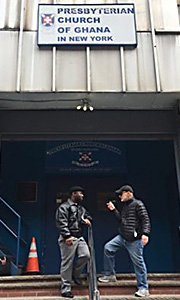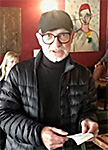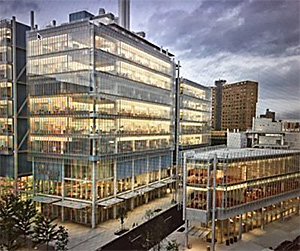A Writer Writes — “The Peace Corps: It Can Get in Your Blood” by Bob Criso (Nigeria)
THE PEACE CORPS: IT CAN GET IN YOUR BLOOD
by Bob Criso (Nigeria 1966-67, Somalia 1967-68)
•
 The Reverend Nana Yaw Amponsah Antwi is pastor of The Presbyterian Church of Ghana, half a block away from my apartment. Every Sunday the street buzzes with women dressed in those resplendent West African prints and stylishly-sculpted head-wraps. Some of the men walk with obvious pride in their traditional robes, others just wear suits. The kids look like American kids but everyone looks so spiffed up as if they were going to a wedding. I overhear their melodic Twi which sounds similar to the Igbo that I studied for hours every day during Peace Corps training. Sometimes the women set up tables in front of the church after services and sell traditional foods like garri, yams and palm oil. These were the very staples of my diet in Ishiagu, Nigeria. If I get a craving for any of it, there are Ghanian and Sengalese restaurants nearby.
The Reverend Nana Yaw Amponsah Antwi is pastor of The Presbyterian Church of Ghana, half a block away from my apartment. Every Sunday the street buzzes with women dressed in those resplendent West African prints and stylishly-sculpted head-wraps. Some of the men walk with obvious pride in their traditional robes, others just wear suits. The kids look like American kids but everyone looks so spiffed up as if they were going to a wedding. I overhear their melodic Twi which sounds similar to the Igbo that I studied for hours every day during Peace Corps training. Sometimes the women set up tables in front of the church after services and sell traditional foods like garri, yams and palm oil. These were the very staples of my diet in Ishiagu, Nigeria. If I get a craving for any of it, there are Ghanian and Sengalese restaurants nearby.
Next to the church is New Tops African Braiding, the name emblazoned in red block letters on the yellow awning overhanging a line of glass front windows. This place hums with activity, from early morning to late at night. West African hairdressers perform their magic and turn unruly heads of hair into designs that look like a new art form. It turns my head every time I walk by those windows. For a few seconds I’m in Lagos.
Two blocks North of my apartment is a major intersection called African Square. Take a walk along the crowded commercial blocks any day and you’ll see a mixture of locals who have been there for generations, African immigrants who have been around for maybe two months or two generations, tourists from around the globe in open-air double-decker busses and American visitors snapping pictures as if they were in another country. Vendors line the wide sidewalks selling DVD’s, watches, clothes, souvenirs and food while music blasts from boomboxes. It’s a sidewalk flea market every day. Walking tours are popular and gospel services on Sunday a must for many. Tourists line up early on Sunday mornings, waiting to get in. I hear languages from around the world whenever I pass by.
 I’m talking about Harlem, of course. I moved there after I retired ten years ago. I rent an apartment in a brownstone on West 123rd Street. The owner is a retired Harlem elementary school teacher. There are four apartments in the building; I’m the only non-family resident. It was a bit of a culture shock after having lived in leafy Princeton for fifteen years, but then again, I’ve had some prior experience with culture shock and being a minority in town.
I’m talking about Harlem, of course. I moved there after I retired ten years ago. I rent an apartment in a brownstone on West 123rd Street. The owner is a retired Harlem elementary school teacher. There are four apartments in the building; I’m the only non-family resident. It was a bit of a culture shock after having lived in leafy Princeton for fifteen years, but then again, I’ve had some prior experience with culture shock and being a minority in town.
Gentrification is moving along rapidly in Harlem, as it is in every corner of the formerly-less-expensive neighborhoods in Manhattan. It’s more controversial in Harlem became of its history as the center of black culture. Long-timers are being pressured out by developers eager to build condo towers. Frederick Doulass Boulevard (an extension of Central Park West) now has a new condo tower on almost every block form 110th Street to 123rd Street. Add the fancy, expensive restaurants, Whole Foods, W Hotel, all just a block or two away from my place. Seventeen acres were leveled on the west end of 125th Street to 133rd Streets to build the new futuristic Manhattanville campus of Columbia University.
has a new condo tower on almost every block form 110th Street to 123rd Street. Add the fancy, expensive restaurants, Whole Foods, W Hotel, all just a block or two away from my place. Seventeen acres were leveled on the west end of 125th Street to 133rd Streets to build the new futuristic Manhattanville campus of Columbia University.
I left Africa over fifty years ago but Africa hasn’t left me. I seem to find it wherever I go, sniff it out as if it’s an indelible a part of me. In Princeton, I would find the African students, the African professors, the African-related cultural events. One female colleague in Psychological Services, an African-American, wore West African traditional dress on a daily basis. Every day, without fail, I will find something in the New York Times that brings me back to Africa.
Over the years I’ve visited twenty something African countries, so reading the news always has more meaning when I’ve been to that country. It’s alarming how many of those countries would be too dangerous to visit today. (My second Peace Corps experience was in Somalia.) I’m also alert to African names, not only in the newspaper’s political coverage but in the rapidly growing number of African, often Nigerian, often Igbo, sometimes Yoruba names in the I theater, movie, book, style, sports, food and business sections of the paper. I review plays in New York and interview playwrights for articles. Recently, I interviewed a female Igbo playwright, Ngozi Anyanwu, definitely a future star. There are many up-and-comers in these fields, too numerous to list, often second generation Americans, some of whose parents left during the Nigerian civil war. They are so thrilled when you know the names of towns like Okigwe and Arochuku where their grandparents still live. Often the conversation will lead to, “What was it like during the war? My parents don’t talk about it.”
Joining the Peace Corps dramatically changed my life and pointed me in the right direction. Going back with a Peace Corps group in 2008, visiting Ishiagu and talking with three former students was, again, a life-changing experience. The 2008 group was in Kano when Obama was elected. Nigerians beamed with pride and we all became Obama representatives.
I wonder what the more recent Peace Corps experience is like. Does it still have the same kind of impact on one’s life? Does it endure as the years pass? I wouldn’t want to generalize but I wonder if the new breed share the same values and feelings as the pioneers or is it a fundamentally different kind of Peace Corps now? What’s it like being a Volunteer abroad with Trump as President? Was there something special, something so unique and revolutionary, about the sixties and being one of Kennedy’s children that has been lost, something that might also be lost from American culture overall?
•
Bob Criso (Nigeria 1966-67, Somalia 1967-68) was a psychotherapist at Princeton University and also had a private practice. He lives in New York City, writes memoir, does theater reviews and has had six photography exhibits. bobcriso@gmail.com
Wonderful essay. Your thoughts and experiences resonate with me. My spouse and I met in Colombia in PC in 1962. We, too, have questions about what the more recent Peace Corps experience is like and the impact it has on current PCVs. Two of our daughters served in Peace Corps in the 1990s. From what we have observed, they, too, share the values and feelings that we shared being Kennedy’s children. But, am curious and hope to see a response from more recent PCVs.
Kay,
I would like to recommend a facebook page which you might like. It is called “Women of the Peace Corps”. It is not “women of the Peace Corps Legacy”, rather it is a group for women who are RPCVs and also women who are currently serving. It is the latter group which I find so interesting. They use Facebook to share with their fellow PCVs their concerns, their work and ask for suggestions and materials. I think you would enjoy reading it. I served in Colombia “63-“65, so I am far from a “recent” Volunteer.
I found it fascinating to “listen” to these PCV women of today. I still am learning.
Joanne,
Thank you for the recommendation, I will definitely check it out. Our PC service must have overlapped. I served in Group 3 from 1962-64 Urban Community Action. My site was Barrio Antioquia in Medellin. I follow the Peace Corps in Colombia postings on FB and am enjoying them tremendously. We are planning to return to Colombia this summer on a Next Step Travel Viaje to Colombia, the itinerary is still in the works so it has not been posted yet… dates are August 8 to 16.
Last summer, Will Rochin traveled on the Next Step Travel adventure to Colombia. He posted his pictures and it made my spouse and I “very homesick” to return to Colombia one more time.
Carinos,
Kay
Thank you for all your information. Thank you for Peace Corp Colombia. I did not know of the site and I just visited it. It is wonderful!
I have not read your book, yet. I have to confess I was a little bit jealous! What a great family and great stories.
Our services did overlap. I was a member of Colombia Eleven, Health Education/Rural Community Development. My site was south of Cali and just north of Popayan in Cauca. We arrived in Cali, the day after a Peace Corps Volunteer had married the Mayor of Cali. I believe she was a member of Colombia 3.
Our PCL did not meet us at the airport! So my site partner and I bravely took a carro and told the driver, “Cuerpo de Paz”. He took us directly to a barrio and left us off. I knocked on the door. An American woman opened the door and asked us “Who are you?”
I responded, instinctively, “Colombia Eleven”. And, she slammed the door in my face! She opened it again, explained the roomful of RPCVs had all been celebrating the wedding all night and the last thing they needed to see were a new crop of “bright and eager”PCVs. But PC hospitality took over and we were helped to find our PCVL and finally arrived at our site.
Those were the days!
Joanne,
Those were the days my friend, we thought they’d never end….
The PCV who married the mayor is a good friend of mine, we remain in contact to this day… her marriage worked very well! Stay in touch!
For my site partner and I, news of the marriage was inspiring! Wish her the belated best!
Great article! Loved your line,”I left Africa over fifty years ago, but Africa hasn’t left me.” I feel the same way about Chile where I served ’68-70. I feel that it, too, pointed me in the right direction, and, like you with Africa, I have returned to Latin America many, many times. Those trips are so healthy: they provide perspective. I also find comfort there.
In these crazy, depressing times, I wonder and worry about today’s volunteers. Even though communication abounds, the world is a much more scary place. I have met with many recent RPCVs. On the good side, they seem to have more skills and experience and practical qualifications. However, I found much less of the sixties’ idealism that so many of the earlier ‘generalists’ had. It seems that many now take a more sober approach when they join the Peace Corps, thinking more along the lines of what those two years mean to their portfolios…sadly, this may be an echo of what’s happening in this country.
David,
My recollection is different from yours. I entered training in July of 1963. Our selection interviewers did not want idealistic answer to the iconic question: “Why do you want to join the Peace Corps.” We understood that we had to have practical reasons, of which future career opportunities were at the top.
In the summer of 1963, it looked as if the Kennedy dynesty could go on for decades and Peace Corps was one good way to try and get in on the ground floor. For women, there were not many career opportunities and Peace
Corps was certainly attractive for that reason.. Today’s women have so many more opportunities than we did, then. I found them more altruistic for that reason. And, of course, for recently graduated men, Peace Corps was an excellent way to delay the Draft or perhaps ultimately avoid it all together.
I think each generation has its own “mission” and its own crusade. I like to think then and now, Peace Corps Volunteers are emblamatic of their generation.
Bravo. Well done, and a fine reflection of the experience many of us had… and continue
to have.
My husband and I served in Ecuador number 1 from 1962-64. It was truly an experience that changed our lives forever! We found that “Community Development “ was an open-ended opportunity to get to know the people of our fishermen neighborhood and develop self help projects with them. Adopting two small Ecuadorian children really set our lives in a new path and its influence still affects us today. We also wrote The Barrios of Manta”. the first ever published Peace Corps memoir, available now as an eBook, at http://bit.ly/NARTUF. I am 83 now and still a champion of all that great PC stuff!